| Listing 1 - 10 of 13 | << page >> |
Sort by
|
Book
ISBN: 9068340549 Year: 1990 Publisher: Bloemendaal Aramith
Abstract | Keywords | Export | Availability | Bookmark
 Loading...
Loading...Choose an application
- Reference Manager
- EndNote
- RefWorks (Direct export to RefWorks)
Feynman, Richard P. --- 929 FEYNMAN, RICHARD P. --- 82-94 FEYNMAN, RICHARD P. --- Biografie. Genealogie. Heraldiek--FEYNMAN, RICHARD P. --- 929 FEYNMAN, RICHARD P. Biografie. Genealogie. Heraldiek--FEYNMAN, RICHARD P. --- 929 FEYNMAN, RICHARD P --- 82-94 FEYNMAN, RICHARD P --- Biografie. Genealogie. Heraldiek--FEYNMAN, RICHARD P
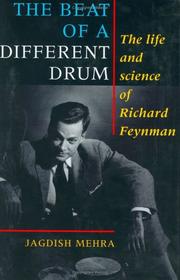
ISBN: 0198539487 9780198539483 Year: 1994 Publisher: Oxford: Clarendon,
Abstract | Keywords | Export | Availability | Bookmark
 Loading...
Loading...Choose an application
- Reference Manager
- EndNote
- RefWorks (Direct export to RefWorks)
Physicists --- Physiciens --- Biography. --- Biographie --- Feynman, Richard P. --- Biography --- Feynman, Richard Phillips --- 53 <092> --- -Physical scientists --- Physics--Biografieën --- Feynman, Richard Phillips, --- -Physics--Biografieën --- 53 <092> Physics--Biografieën --- -53 <092> Physics--Biografieën --- Feynman, Richard Phillips. --- Physicists - United States - Biography
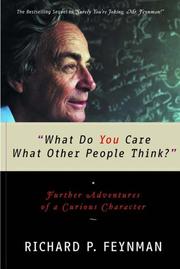
ISBN: 0393026590 9780393026597 0393320928 9780393320923 Year: 1988 Publisher: New York (N.Y.): Norton,
Abstract | Keywords | Export | Availability | Bookmark
 Loading...
Loading...Choose an application
- Reference Manager
- EndNote
- RefWorks (Direct export to RefWorks)
One of the greatest physicists of the twentieth century, Richard Feynman possessed an unquenchable thirst for adventure and an unparalleled ability to tell the stories of his life.
Physicists --- Science --- Physiciens --- Sciences --- Biography. --- Anecdotes --- Biographie --- Feynman, Richard P. --- Biography --- Feynman, Richard Phillips --- -Science --- -Natural science --- Science of science --- Physical scientists --- Anecdotes. --- Feynman, Richard Phillips, --- -Biography --- Feynman, Richard Phillips. --- Science - Anecdotes --- Physicists - United States - Biography
Book
ISBN: 9076988951 9789076988955 Year: 2006 Publisher: Amsterdam Natuurwetenschap & Techniek
Abstract | Keywords | Export | Availability | Bookmark
 Loading...
Loading...Choose an application
- Reference Manager
- EndNote
- RefWorks (Direct export to RefWorks)
53 <092> --- 53 FEYNMAN, RICHARD --- 001 wetenschap --- 929 biografieën --- 53 fysica --- 530 --- Feynman --- 53 --- 929 --- Fysica --- Richard Feynman --- feynman --- natuurkunde (fysica) --- 53 <092> Physics--Biografieën --- Physics--Biografieën --- Physics--FEYNMAN, RICHARD --- Natuurkunde --- fysica --- Feynman, Richard P.

ISBN: 0679408363 0316903167 9780316903165 Year: 1992 Publisher: Boston (Mass.): Little, Brown and Company,
Abstract | Keywords | Export | Availability | Bookmark
 Loading...
Loading...Choose an application
- Reference Manager
- EndNote
- RefWorks (Direct export to RefWorks)
Feynman, Richard P. --- Physics --- Physicists --- Physiciens --- Physique --- history --- biography --- Biography --- History --- Biographie --- Histoire --- Biography. --- -Physics --- -929 FEYNMAN, RICHARD --- Natural philosophy --- Philosophy, Natural --- Physical sciences --- Dynamics --- Physical scientists --- -Feynman, Richard Phillips --- 5 <092> --- #WSCH:AAS2 --- Wiskunde. Natuurwetenschappen--Biografieën --- 5 <092> Wiskunde. Natuurwetenschappen--Biografieën --- 53 <081> --- 53 <081> Physics--Verzameld werk van individuele auteurs --- Physics--Verzameld werk van individuele auteurs --- 929 FEYNMAN, RICHARD --- Feynman, Richard Phillips. --- biography. --- United States --- Physicists - United States - Biography. --- Physics - History - 20th century. --- Feynman (richard) --- Biographies
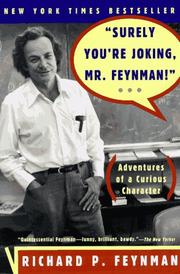
ISBN: 9780393316049 0393019217 9780393019216 0393316041 Year: 1985 Publisher: New York
Abstract | Keywords | Export | Availability | Bookmark
 Loading...
Loading...Choose an application
- Reference Manager
- EndNote
- RefWorks (Direct export to RefWorks)
Winner of the Nobel Prize for Physics in 1965, Richard Feynman was one of the world's greatest theoretical physicists, but he was also a man who fell, often jumped, into adventure. An artist, safecracker, practical joker and storyteller, Feynman's life was a series of combustible combinations made possible by his unique mixture of high intelligence, unquenchable curiosity and eternal skepticism. Over a period of years, Feynman's conversations with his friend Ralph Leighton were first taped and then set down as they appear here, little changed from their spoken form, giving a wise, funny, passionate and totally honest self-portrait of one of the greatest men of our age.
Physicists --- Science --- Feynman, Richard P. --- Feynman, Richard Phillips, --- Feĭnman, Richard P., --- Feynman, R. P. --- פינמן, ריצ'רד פיליפס. --- Physics --- Feynman, Richard P --- (Richard Phillips), 1918 --- -Physicists --- #SBIB:316.23H2 --- Sociologie van de wetenschappen --- -1945-1990 --- 53 --- -Science --- -#WSCH:AAS2 --- Natural science --- Science of science --- Sciences --- 53 Physics --- Biography --- Humor --- Feynman, Richard Phillips --- #WSCH:AAS2 --- Feynman, Richard Phillips. --- -Feynman, Richard P. --- Biography. --- Humor. --- Physiciens --- 1945-1990 --- Anecdotes --- Anecdotes. --- 53 Fysica. Natuurkunde --- Fysica. Natuurkunde
Book
ISBN: 9068340638 Year: 1990 Publisher: Bloemendaal Aramith
Abstract | Keywords | Export | Availability | Bookmark
 Loading...
Loading...Choose an application
- Reference Manager
- EndNote
- RefWorks (Direct export to RefWorks)
929 FEYNMAN, RICHARD P. --- 342.537.7 <73> --- 629.784 --- 614.8-084 --- #WPLT:dd.Prof.J.Van Assche --- Biografie. Genealogie. Heraldiek--FEYNMAN, RICHARD P. --- Parlementair onderzoek. Parlementaire onderzoekscommissie--Verenigde Staten van Amerika. VSA. USA --- Ferry and rendezvous space vehicles (for transporting personnel and equipment to orbital and interplanetary stations etc.) --- Preventive, protective measures --- 614.8-084 Preventive, protective measures --- 629.784 Ferry and rendezvous space vehicles (for transporting personnel and equipment to orbital and interplanetary stations etc.) --- 342.537.7 <73> Parlementair onderzoek. Parlementaire onderzoekscommissie--Verenigde Staten van Amerika. VSA. USA --- 929 FEYNMAN, RICHARD P. Biografie. Genealogie. Heraldiek--FEYNMAN, RICHARD P. --- 929 FEYNMAN, RICHARD P --- Biografie. Genealogie. Heraldiek--FEYNMAN, RICHARD P
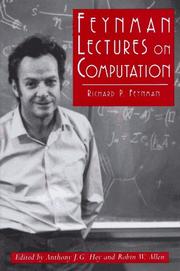
ISBN: 0201489910 9780738202969 9780201489910 0738202967 Year: 1996 Publisher: Reading, Mass.: Addison-Wesley,
Abstract | Keywords | Export | Availability | Bookmark
 Loading...
Loading...Choose an application
- Reference Manager
- EndNote
- RefWorks (Direct export to RefWorks)
From 1983 to 1986, the legendary physicist and teacher Richard Feynman gave a course at Caltech called "Potentialities and Limitations of Computing Machines."Although the lectures are over ten years old, most of the material is timeless and presents a "Feynmanesque" overview of many standard and some not-so-standard topics in computer science. These include computability, Turing machines (or as Feynman said, "Mr. Turing's machines"), information theory, Shannon's Theorem, reversible computation, the thermodynamics of computation, the quantum limits to computation, and the physics of VLSI devices. Taken together, these lectures represent a unique exploration of the fundamental limitations of digital computers.Feynman's philosophy of learning and discovery comes through strongly in these lectures. He constantly points out the benefits of playing around with concepts and working out solutions to problems on your own-before looking at the back of the book for the answers. As Feynman says in the lectures: "If you keep proving stuff that others have done, getting confidence, increasing complexities of your solutions-for the fun of it-then one day you'll turn around and discovers that nobody actually did that one ! And that's the way to become a computer scientist."
Electronic data processing --- Informatique --- Feynman, Richard P. --- Feynman, Richard Phillips --- Electronic data processing. --- Quantum mechanics. Quantumfield theory --- ADP (Data processing) --- Automatic data processing --- Data processing --- EDP (Data processing) --- IDP (Data processing) --- Integrated data processing --- Computers --- Office practice --- Automation --- Logic, Symbolic and mathematical. --- Informatique. --- Logique mathématique. --- Feynman, Richard Phillips,
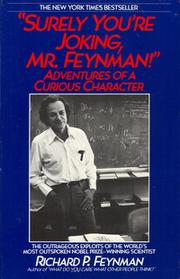
ISBN: 0553346687 9780553346688 Year: 1989 Publisher: Toronto: Bantam books,
Abstract | Keywords | Export | Availability | Bookmark
 Loading...
Loading...Choose an application
- Reference Manager
- EndNote
- RefWorks (Direct export to RefWorks)
Physicists --- Science --- Biography --- Humor --- Feynman, Richard Phillips --- 303 --- -Science --- -Physical scientists --- Natural science --- Science of science --- Sciences --- Methoden bij sociaalwetenschappelijk onderzoek --- -Methoden bij sociaalwetenschappelijk onderzoek --- 303 Methoden bij sociaalwetenschappelijk onderzoek --- -303 Methoden bij sociaalwetenschappelijk onderzoek --- Physical scientists --- -Natural science --- Feynman, Richard Phillips. --- Physicists - United States - Biography --- Science - Humor

ISBN: 9812563660 9812563806 9789812563804 9789812563668 Year: 2005 Publisher: Hackensack, NJ: World scientific,
Abstract | Keywords | Export | Availability | Bookmark
 Loading...
Loading...Choose an application
- Reference Manager
- EndNote
- RefWorks (Direct export to RefWorks)
Richard Feynman's never previously published doctoral thesis formed the heart of much of his brilliant and profound work in theoretical physics. Entitled "The Principle of Least Action in Quantum Mechanics," its original motive was to quantize the classical action-at-a-distance electrodynamics. Because that theory adopted an overall space-time viewpoint, the classical Hamiltonian approach used in the conventional formulations of quantum theory could not be used, so Feynman turned to the Lagrangian function and the principle of least action as his points of departure. The result was the path
530.145 --- 530.145 Quantum theory --- Quantum theory --- Least action --- Lagrangian functions --- Quantum mechanics. Quantumfield theory --- Feynman, Richard P. --- Quantum dynamics --- Quantum mechanics --- Quantum physics --- Physics --- Mechanics --- Thermodynamics --- Variational principles --- Functions, Lagrangian --- Calculus of variations --- Dynamics --- Mathematical optimization --- Acqui 2006
| Listing 1 - 10 of 13 | << page >> |
Sort by
|

 Search
Search Feedback
Feedback About UniCat
About UniCat  Help
Help News
News